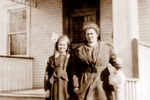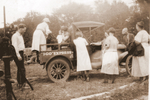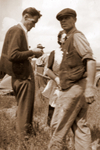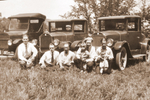 |
|||
|
|||
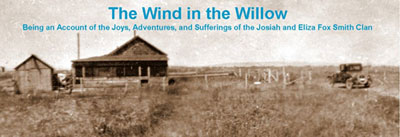 |
|||
Mary Grace Smith White Hanley |
|||
| Maryon White's Memories of her Aunt Grace, November 1, 1991 | As previously mentioned, Grace was the oldest child of Josiah and Eliza Smith. She was born in Kansas somewhere around 1885 (+ or -). She was considered to be the most beautiful of the five girls (although Ethel ran a very close second.) [The] consensus seems to be that Grace and Ethel were beautiful, Twyla was pretty and Bertha and Gus rather plain. Beauty is only skin deep, they say, and it is the inside that matters. I sincerely hope this is true!
I don't recall any stories about Grace's early life, but she was destined to have a pretty rough go as an adult. She had the misfortune to fall in love with a handsome and charming scoundrel named Walt White (no relation to me!). He was quite a bit older than Grace, and came from a respected and respectable family. His sister, Jane, was married to Eliza's brother Now, I cannot imagine any self respecting tribe of Indians calling themselves Rosebuds, but one of Walt's first jobs was as an Indian agent in South Dakota. I don't know if Rosebud was the name of the tribe, the nearest town, or what, but their only child, Vera, was born in South Dakota and used to joke about being a little rosebud. As should have been expected, Walt didn't last long at this job. There was something about selling liquor to the Indians or cheating them or something. By 1917, they were living in Sioux City and Walt was working for the Chicago Portrait Company. As a result of his usual wheeling and dealing, he wound up in charge of several crews of salesmen. My Dad was hired in Chicago and sent to work for Walt. He was 17 or 18, fresh out of high school and just rejected by the army. He met Twyla (she was 13 or 14) at Grace's home. Bryan also worked for Walt for a while, but apparently he was a better judge of character than my Dad was and Bryan soon quit and moved to Red Oak. (Dad was a salesman, Bryan a driver who transported sales crews from town to town and delivered pictures previously ordered.) [Grace's daughter] Vera was only 7 or 8 years younger than Twyla and they became lifelong friends (not always true of relatives!) The years between 1917 and 1924 must have been very difficult for Grace and Vera. Walt deserted them somewhere along the line, Grace became deeply involved with the Jehovah's Witnesses and Vera became a juvenile delinquent. She was in and out of the Good Shepherd's Home several times and soon developed a drinking problem which persisted all her life. No one knew anything about Walt for years, but around 1940, his sister Jane (Bomie's wife) was notified that he had been killed in a barroom brawl in Tacoma, Washington. His body was shipped to Busheyhead, OK and he was buried there. Prior to 1924, and having divorced Walt for desertion, Grace met and married a perfectly respectable man named Perry Hanley who owned a small delivery business called I-Go-Express. Wouldn't you know some smart Smith named him Perry Igo, and many people thought that was his real name! There is a big blank in my memory of Grace until 1930. By this time, we were living in Sioux City as were Bryan and his family, Jack, and of course, the Hanleys. Vera had married a very nice man named Cliff Rikard and joined the Catholic Church. Her drinking continued to be a problem to everyone and Jack was also drinking too much, so there was much unhappiness for the whole family. Grace had become enormously obese and in 1930 was confined to bed. I don't know what the problem was, stroke, pneumonia, bad heart or what, but it could only have been aggravated by all the excess blubber. They had a bed for her in the dining room of their home, and mother frequently took us kids to see her. Grace always wanted us to go get cookies from the pantry, but we were afraid. The floor of the pantry was a trap door to the basement and we were afraid we'd fall down that hole! If that floor could support 300+ pounds of Grace, it was probably safe for two little kids. I digress here to point out that there is apparently a genetic factor from the Fox line which causes some of us to become grotesquely overweight. I remember some of Eliza's sisters were enormous, although Orpha was very tiny. Eliza herself had a weight problem, then Grace, Twyla and Elmer in their generation. Now Joan Irwin and I are cursed with this compulsive eating syndrome plus 100% assimilation of everything we eat. I hope if any of you, or any of your kids, show signs of a similar problem that you will try to control it from the start. I consider myself a hopeless case and will no longer be a yo-yo. I don't know how Joan feels about it. Here is an example of knowing a bit about your heredity. Grace died in the winter of 1930 (January 8). Elmer beloved wife, Emma, died just one day before or after Grace. Think how hard it must have been for Elmer, yet both Twyla and Hazel [Elmer's oldest daughter] told me that in public at least, he remained in control and tried to comfort his six children. Both of these women were in their early 40s or even younger. (Emma was 39) Vera and Cliff continued to write and visit us wherever we were living-Fargo, Des Moines, Denver and even one memorable vacation in Wyoming. After Cliff died, Vera sort of fell apart. Her drinking got worse, and she caused problems for all her aunts and uncles. For a while, she continued to visit us, each time with a different "hubby" until mother finally told her that she (Vera) would always be welcome in our home, but not to bring any more men around. The friendship cooled for a while, but Vera once told Ethel that she had always kept tack of her relatives. They did not always see her, but she got around often to check on them. When this conversation occurred, Vera and her current "hubby" had stopped at Ethel's station for a tank of gas. Apparently, Vera did not even intend to get out of the car, but Ethel recognized her and insisted she come in. Vera would never give anyone an address or telephone number, but instead told us to write to her in care of some bartender in Phoenix (I think--I get Phoenix and Tucson mixed up!). Later she gave me the name of a friend, Toby Higgins, and it was Toby who notified me of Vera's death in the 70s. For the last several years of her life, Vera went by the name of Irene Pinkham. Apparently she actually married someone named Pinkham who was a veteran, because when she was stricken with cancer, she was in and out of some big veteran's hospital in Arizona. Maybe her middle name was Irene and she just got tired of being Vera, but it is also possible (maybe even probable) that she needed a new name for safety's sake. |
||
|
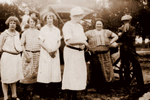 Vera White Rickard holding Maryon White in back. In front Perry's niece, Twyla, Augusta Smith Larson, Perry's sister, Grace, and Perry Hanley
|
||
Vera called all her aunts and uncles frequently, especially when she had been drinking too much. Sometimes she wanted money, sometimes she just wanted to talk. One time Jack asked her how she made her living, but he did not understand what she said. When he asked her to repeat it, she said "Jack an old cab driver shouldn't have to ask that" and changed the subject. Jack and I decided maybe she said "hooker" or "pusher," but he said that didn't sound quite right either. Twyla finally got to the point where she just couldn't talk to Vera at all. The last few times she called me, she'd say she wanted to say "goodbye" she was going to commit suicide. One time I was inspired to say "Vera did you ever go back to your church?" She replied "Maryon, I never left my church. Where upon I responded, "Then you know what the church says about suicide." She never mentioned suicide again-at least not to me. So from this chapter you should have gathered that we all need to watch what we put in our mouths (be it food or alcohol) that we all seem to feel the need for some kind of faith to sustain us, and that we all have unusually strong family attachments. I'll not leave much space before I start on my memories of Elmer. I don't suppose many of you ever heard of Grace and Vera, but if you do have any stories to add or questions to ask, now is the time. |
|||
| Ethel Taylor's Memories of her sister Grace, 1992 | I must add my little portion to my oldest sister and brother. I was the middle one of nine children and the four older ones were married when I was still just a girl. Grace, to my remembrance was a beautiful sweet sister. She was so kind and good to us younger ones. She only had one daughter and she was such a darling baby. Grace passed away while I was on the ranch with my family so didn't get to be with her much in her last days. | ||
| Lillian Smith's Memories of her niece, Vera, Portland Oregon , January 3, 1992 | I don't have too many memories of Vera, as like Maryon said, she was almost always drunk. We lived in her house before coming to Portland. Last time she came to see us when we lived on Edison Street, she asked if she could leave two trunks until she could find an apartment. Never did come after them. Had word she passed away so broke the locks and she had a few pictures and utensils. Also dirty clothes. Still have pictures and pans. Disposed of trunks and clothes. Cliff was a wonderful man to put up with her drinking. His health was not the best. | ||
| Robert Jack Smith's Memories of his Aunt Grace, April 27, 1992 | I have a very vague memory of visiting Aunt Grace in Sioux City, Iowa when I was five years old. [I] recall some very high wooden steps leading to front porch of her house. My memory of Aunt Grace was that she was a very large, cheerful woman. I have no memories of Vera, her daughter. | ||
| Bill Smith's Memories of his Aunt Grace, December 22, 1991, Vashon, Washington | I was 8 years old the latter part of 1928 and early 1929 when we lived in Leeds, suburb of Sioux City, Iowa, and I remember Aunt Grace and Perry Hanley only vaguely. Jack and I, and I assume, our parents, visited their house (or apartment?) a few times. It seems to me that they lived upstairs, or on a hill. Anyway, you had to go up to get into the living room. Aunt Grace was very heavy, but she had a clear resonant voice, a nice smile and was very cheerful and pleasant to us. There was a rug on the floor. She gave us little toy trucks to play with, and if you pressed with your finger on top of the cab, the box of the truck would come up. Doesn't seem technologically feasible, but that's what's in my memory bank. They had a yard in back with a shed; it was sort of uphill from the house. I crawled up the shed and fell, and everyone thought I broke my collarbone. I remember Cliff Ricard and Vera when they came to Wyoming. Cliff was pleasant, well met and everyone liked him. Vera was chubby, but quite pretty in the face, and had a nice smile and liked to joke with us kids. This must have been in the 1930s and I think that Cliff and Vera may have visited Wyoming more than once. My next memory is of Vera in Portland, Oregon about 1943-44, December/January. I was home on leave from the navy visiting the folks who lived at Vanport, Oregon. Vera lived with a handsome devil, a gambler type, in an apartment in Portland. I went to see Vera a couple of times. Her live-in man had given her a couple of black eyes that she was recovering from. He was gone when I was there. I had met him previously, I think, when he and Vera visited us or Uncle Jack's family in Vanport. When I visited Vera, she said her husband wouldn't give her any money, so I took her out, on her suggestion I think, and bought her a beer. Vera was smart enough and pretty enough, and she was nice to me, but she was evidently rebellious got started wrong, her father not helping the situation. Since Maryon didn't mention it, I will say that I think either she or Aunt Twyla told me that Aunt Grace's grave has been lost. She was buried in Sioux City, I think and after she was buried, they buried one or more people in the same place. When some of the family tried to find out from Perry Hanley what happened and where the grave was, they couldn't get a good answer. This is my mixed up memory of where Aunt Grace is buried. |
|
|
|
|||
|
©Roberta Tuller 2023
|
|||
